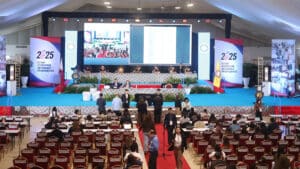MANILA, Philippines—Ayala Corp. is making a bigger bet on the country’s most important resource—human capital—with the rollout starting this year of a chain of for-profit schools armed with a curriculum that’s “reverse-engineered” to address the skills gap in the local and international labor market.
Ayala, which recently divested its interest in a call center business with about 40,000 employees, has committed to grow its remaining business process outsourcing (BPO) investee-companies but what it intends to scale up is its entry into the for-profit education sector. Through organic growth as well as by looking for potential acquisitions, Ayala intends to hit a student population base of 10,000 in basic education and 10,000 in higher education “as soon as possible,” Alfredo Ayala, president of LiveIT Investments Ltd., said in an interview at the sidelines of Ayala Corp.’s annual stockholders’ meeting on Friday.
“The idea is to continue to build on those (BPO investees) but I think the real emphasis this year is starting to apply lessons from our involvement in the BPO sector to the education sector,” Ayala said.
The Ayala group has created a separate holding company for education called LiveIT Global Services Management Institute Inc. (LGSMI), which teamed up with British education firm Pearson last January to put up Affordable Private Education Center (Apec). Ayala owns 60 percent of Apec while Pearson owns 40 percent.
LGSMI has allocated a little over $4 million as seed money for the first few schools while Pearson has committed a separate amount commensurate to its 40-percent interest.
“For this year, we’re opening roughly a dozen schools with a capacity to accommodate 2,000 to 3,000 students. So that’s the beginning of the chain,” Ayala said. The first schools would be set up in the most congested areas of the metropolis to align them with the Department of Education’s major priorities, he added. These include Quezon City, Caloocan, Marikina, Pasig and Manila.
The chain of schools will focus only on basic education starting from Grades 7 to 12 (already factoring in the shift to the K-12 system) as well as higher education. The latter will offer traditional college courses as well as short-term (six-month to two-year) courses. Average tuition is estimated at P25,000 a year, a level deemed “affordable” to a broader market.
To pilot-test this venture into the education business, Apec took in last year an initial batch of about a hundred students who were given a curriculum tailor-fit to what potential employers needed. “We literally brought Ayala companies to the campus and asked BPI or Globe (Telecom) to tell us what they need to hire by March, what are the specs, observe the high performers in their premises and let’s reverse-engineer the curriculum,” he said.
At the end of the pilot program, he said the students learned new skills like processing bank loans or selling Android phones or leading a small IT team. “By the time they graduate they can hit the ground running,” Ayala said. He added that 95 percent of the graduates from the pilot program found jobs after 90 days with an average starting salary of P16,000 a month, or higher than the average starting salary of P12,000 a month in the country.


